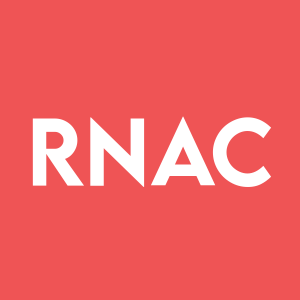Cartesian Therapeutics Announces Presentation of Results from Phase 2b Trial of Descartes-08 in Patients with Myasthenia Gravis at the 2024 MGFA Scientific Session of the AANEM Annual Meeting
Rhea-AI Summary
Cartesian Therapeutics (NASDAQ: RNAC) presented data from its Phase 2b trial of Descartes-08 in patients with generalized myasthenia gravis (MG) at the 2024 MGFA Scientific Session of the AANEM Annual Meeting. The trial achieved its primary endpoint with statistical significance, with 71% of Descartes-08 treated patients showing ≥5-point improvements in MG Composite score at Month 3 compared to 25% in the placebo group (p=0.018).
Descartes-08, an autologous mRNA-engineered CAR-T therapy targeting BCMA, demonstrated a favorable safety profile supporting outpatient administration without preconditioning chemotherapy. The treatment was associated with reduced anti-AChR antibody titer levels and did not lead to decreased vaccine titers or increased infection rates.
Cartesian plans to hold an End-of-Phase 2 meeting with the FDA by year-end 2024 to discuss initiating a Phase 3 clinical trial of Descartes-08 in MG.
Positive
- Phase 2b trial of Descartes-08 achieved primary endpoint with statistical significance (p=0.018)
- 71% of Descartes-08 treated patients showed ≥5-point improvements in MG Composite score at Month 3
- Descartes-08 demonstrated a favorable safety profile supporting outpatient administration
- Treatment associated with reduced anti-AChR antibody titer levels
- No observed decrease in vaccine titers or increased infection rates
- FDA granted Regenerative Medicine Advanced Therapy (RMAT) Designation and Orphan Drug Designation for Descartes-08
Negative
- None.
News Market Reaction 1 Alert
On the day this news was published, RNAC declined 5.58%, reflecting a notable negative market reaction.
Data tracked by StockTitan Argus on the day of publication.
Company continues to expect to hold an End-of-Phase 2 meeting with the FDA by year-end
GAITHERSBURG, Md., Oct. 15, 2024 (GLOBE NEWSWIRE) -- Cartesian Therapeutics, Inc. (NASDAQ: RNAC) (the “Company”), a clinical-stage biotechnology company pioneering mRNA cell therapy for autoimmune diseases, today announced the presentation of data from its Phase 2b trial of Descartes-08 in patients with generalized myasthenia gravis (MG) during the 2024 Myasthenia Gravis Foundation of America (MGFA) Scientific Session of the American Association of Neuromuscular and Electrodiagnostic Medicine (AANEM) Annual Meeting being held today in Savannah, Georgia. Positive topline results from the trial were previously announced in July 2024. A copy of today’s presentation will be available in the Publications and Presentations section of the Company’s website.
Descartes-08, Cartesian’s lead mRNA cell therapy candidate, is an autologous mRNA-engineered chimeric antigen receptor T-cell therapy (mRNA CAR-T) product candidate targeting B-cell maturation antigen (BCMA). Descartes-08 is designed to be administered without preconditioning chemotherapy and does not use integrating vectors. Descartes-08 was previously granted Regenerative Medicine Advanced Therapy (RMAT) Designation and Orphan Drug Designation by the U.S. Food and Drug Administration (FDA) for the treatment of MG.
“Descartes-08 has strong potential for deep and durable improvements in patients with MG treated in the convenient outpatient setting without preconditioning chemotherapy and with no observed-to-date increased risk of infection,” said Carsten Brunn, Ph.D., President and Chief Executive Officer of Cartesian. “We look forward to continuing to collaborate with the FDA to determine next steps for the Descartes-08 program for MG and plan to hold an End-of-Phase 2 meeting by the end of this year. We are steadfast in our commitment to advancing our pipeline of innovative mRNA cell therapy candidates to extend the reach of this powerful modality to patients with autoimmune conditions.”
Trial Overview and Topline Results
In the Phase 2b double-blind, placebo-controlled, crossover trial, a total of 36 heavily pre-treated, highly symptomatic patients with MG were randomized 1:1 to receive either Descartes-08 or placebo administered as six weekly outpatient infusions without preconditioning chemotherapy. At the conclusion of the trial’s Month 3 blinded follow-up assessment, patients receiving placebo were eligible to cross over to Descartes-08 treatment.
- The trial achieved its primary endpoint with statistical significance in the pre-specified modified intent-to-treat efficacy population, with
71% (10/14) of patients treated with Descartes-08 observed to have 5-point or greater improvements in MG Composite (MGC) score at Month 3 compared to25% (3/12) of patients treated with placebo (p=0.018). - Responders that reached their four-month and six-month assessments were observed to have deep, durable, and clinically meaningful improvements in their MGC severity scores.
- Descartes-08 was observed to have a favorable safety profile supporting outpatient administration without the need for lymphodepleting chemotherapy.
Additional Data Featured in Presentation
In addition to the previously announced topline results, data presented today included the following:
- Patients treated with Descartes-08 were observed to have a reduction in anti-acetylcholine receptor (AChR) antibody titer levels at three months, which is in line with findings from the previously completed Phase 2a trial, compared to an increase observed in patients receiving placebo. Reductions in AChR antibody titer levels are believed to be an early prognostic indicator for clinical improvement in patients with MG.
- Treatment with Descartes-08 was not observed to lead to a decrease in vaccine titers for common viruses and was not associated with increased rates of infection or hypogammaglobulinemia.
The Company expects to hold an End-of-Phase 2 meeting with the FDA by year-end 2024 to review data from the Phase 2b trial and discuss plans for initiating a Phase 3 clinical trial of Descartes-08 in MG.
About Myasthenia Gravis
Myasthenia gravis (MG) is a chronic autoimmune disorder that causes disabling muscle weakness and fatigue. For most people with MG, the disease is characterized by the presence of antibodies against the acetylcholine receptor, a protein found on the surface of nerve cells that plays a key role in muscle contraction. There is currently no cure for MG, and treatment typically requires chronic immunosuppressive medicines, with their attendant risks and side effects.
About Cartesian Therapeutics
Cartesian Therapeutics is a clinical-stage company pioneering mRNA cell therapies for the treatment of autoimmune diseases. The Company’s lead asset, Descartes-08, is an mRNA CAR-T in Phase 2b clinical development for patients with generalized myasthenia gravis and Phase 2 development for systematic lupus erythematosus, with a Phase 2 basket trial planned in additional autoimmune indications. The Company’s clinical-stage pipeline also includes Descartes-15, a next-generation, autologous anti-BCMA mRNA CAR-T. For more information, please visit www.cartesiantherapeutics.com or follow the Company on LinkedIn or X, formerly known as Twitter.
Forward Looking Statements
Any statements in this press release about the future expectations, plans and prospects of the Company, including without limitation, statements regarding the ability of Descartes-08 and Descartes-15 to be administered in an outpatient setting or without the need for preconditioning lymphodepleting chemotherapy or integrating vectors, the potential of the Company’s technology to enable precision control and optimization of engineered cells for diverse cell therapies leveraging multiple modalities, the potential of Descartes-08, Descartes-15, or any of the Company’s other product candidates to treat myasthenia gravis, systemic lupus erythematosus, multiple myeloma, or any other disease, the anticipated timing or the outcome of ongoing and planned clinical trials, studies and data readouts, the anticipated timing or the outcome of the FDA’s review of the Company’s regulatory filings, reductions in AChR antibody titer levels being believed to be an early prognostic indicator for clinical improvement in patients with myasthenia gravis, the Company’s ability to conduct its clinical trials and preclinical studies, the timing or making of any regulatory filings, the anticipated timing or outcome of selection of developmental product candidates, the ability of the Company to consummate any expected agreements and licenses and to realize the anticipated benefits thereof, the novelty of treatment paradigms that the Company is able to develop, the potential of any therapies developed by the Company to fulfill unmet medical needs, and enrollment in the Company’s clinical trials and other statements containing the words “anticipate,” “believe,” “continue,” “could,” “estimate,” “expect,” “hypothesize,” “intend,” “may,” “plan,” “potential,” “predict,” “project,” “should,” “target,” “would,” and similar expressions, constitute forward-looking statements within the meaning of The Private Securities Litigation Reform Act of 1995. Actual results may differ materially from those indicated by such forward-looking statements as a result of various important factors, including, but not limited to, the following: the uncertainties inherent in the initiation, completion and cost of clinical trials including proof of concept trials, including uncertain outcomes, the availability and timing of data from ongoing and future clinical trials and the results of such trials, whether preliminary results from a particular clinical trial will be predictive of the final results of that trial and whether results of early clinical trials or preclinical studies will be indicative of the results of later clinical trials, the ability to predict results of studies performed on human beings based on results of studies performed on non-human subjects, the unproven approach of the Company’s technology, potential delays in enrollment of patients, undesirable side effects of the Company’s product candidates, its reliance on third parties to conduct its clinical trials, the Company’s inability to maintain its existing or future collaborations, licenses or contractual relationships, its inability to protect its proprietary technology and intellectual property, potential delays in regulatory approvals, the availability of funding sufficient for its foreseeable and unforeseeable operating expenses and capital expenditure requirements, the Company’s recurring losses from operations and negative cash flows, substantial fluctuation in the price of the Company’s common stock, risks related to geopolitical conflicts and pandemics and other important factors discussed in the “Risk Factors” section of the Company’s most recent Annual Report on Form 10-K and subsequently filed Quarterly Reports on Form 10-Q, and in other filings that the Company makes with the Securities and Exchange Commission. In addition, any forward-looking statements included in this press release represent the Company’s views only as of the date of its publication and should not be relied upon as representing its views as of any subsequent date. The Company specifically disclaims any intention to update any forward-looking statements included in this press release, except as required by law.
Investor Contact
Melissa Forst
Argot Partners
cartesian@argotpartners.com
Media Contact
David Rosen
Argot Partners
david.rosen@argotpartners.com








